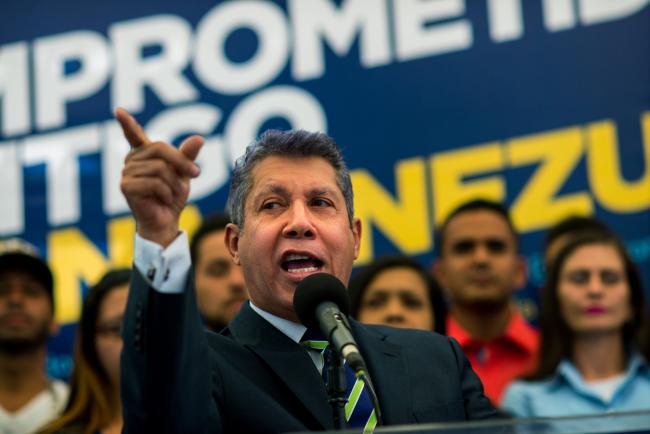(Bloomberg) -- Venezuela needs urgent debt relief and would look to give bondholders small payments in the short-term while pushing back maturities in order to allow the country to return to growth, according to the economic adviser of opposition candidate Henri Falcon.
“Venezuela’s debt is in default and needs to be restructured in the nation’s best interests to get relief in the short term,” Francisco Rodriguez said in an interview on Thursday. “We’re going to propose very small payments in the first years of governance in order to extend payment periods until the economy recovers.”
Under President Nicolas Maduro, Venezuela has finally succumbed to an onerous debt load from the government and state-oil company Petroleos de Venezuela SA. The OPEC nation is behind on about $2 billion of bond payments and its benchmark security due in 2027 is trading at just 31 cents on the dollar. The default, coupled with U.S. sanctions and an economy deep in crisis has sapped financing possibilities for Maduro’s administration which has resorted to unorthodox measures like issuing a sovereign cryptocurrency. International reserves sit at $9.4 billion, down from $27.6 billion five years ago when Maduro took office.
For now, Venezuelan bondholders have remained patient as some interest payments have wiggled their way through complex chains and principal payments have largely been made. If a large enough group of creditors were to unite, they could demand immediate repayment of all foreign bond debt in a process called acceleration.
Rodriguez, a 48-year-old Harvard-trained economist who previously worked at Bank of America (NYSE:BAC) in New York and was chief economist at boutique investment firm Torino Capital until recently, said that there are informal talks with lenders, investors and even government officials but that nothing can be considered formal at this stage.
Dollarization
While Maduro has overseen the collapse of the economy during his term, his government still maintains a core of support near 20 percent of Venezuelans either ideologically aligned with the government or financially dependent on the handouts including monthly food shipments in boxes called CLAPs. What’s Falcon’s response to that policy to woo disenfranchised voters ahead of the May 20 election? “Dollarization.”
Rodriguez says he’s convinced that ditching the bolivar for the U.S. dollar would kick start the economy, return purchasing power to Venezuelans through the allotment of monthly subsidies to all and unite the various exchange rates ranging from 40,000 bolivars per dollar to 230,000 under one roof.
“The majority of countries that dollarize use all of their international reserves, Venezuela is interesting because you can do it with a third of them,” he said. Rodriguez estimates an exchange rate of around 70,000 bolivars per dollar, but the rate would ultimately depend on inflation and the amount of reserves in the central bank’s vault upon taking office.
“If we get to the central bank and nothing is there we’ll have to look for external financing to implement dollarization like Ecuador did.”
Against the pleas of his ostensible allies, former governor Falcon officially kicked off his presidential campaign this week and is now stumping across Venezuela in his bid to bring an end to nearly two decades of socialist rule.
Divisive Figure
While polls give the opposition candidate as much as a double-digit lead over President Maduro, Falcon remains a long shot. Not only is he squaring off against an autocratic incumbent that has extended his grip across nearly all the country’s institutions, but also a boycott of the main traditional opposition parties that will undoubtedly sap him of votes.
“We have two enemies: Maduro and abstention,” said Rodriguez.
Falcon, 56, is a divisive figure. A former military man and ally of Maduro’s predecessor, Hugo Chavez, he broke ranks with the government in 2010 as governor of Lara state. Hardliners view him as a traitor or a turncoat legitimizing a vote rigged in favor of Maduro. But Falcon presents himself as the ideal candidate to bridge a bitter divide, appealing to moderates who are sick of politics as usual and an economy in tatters.
Wracked by food shortages and hyperinflation, Rodriguez is confident the campaign will gain steam. Not voting on May 20 will ultimately give way to six more years of Maduro, Rodriguez says. Falcon is pledging to begin dismantling price and exchange controls immediately upon taking office.
“In three or four years, the Venezuelan economy can perfectly return to being worth $300 billion,” the adviser said.
